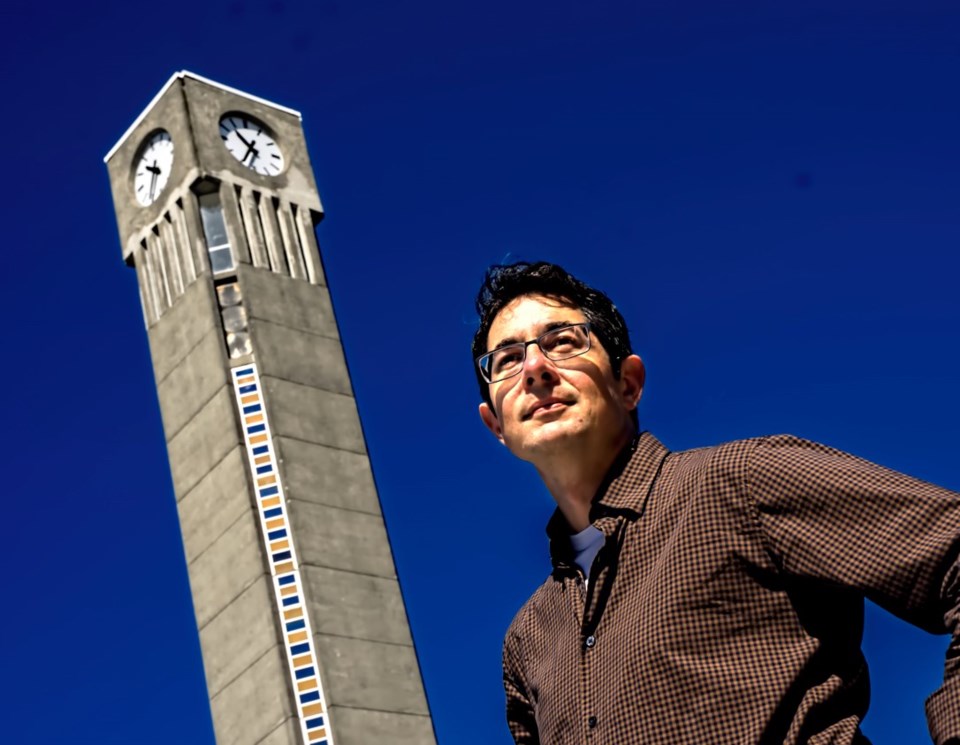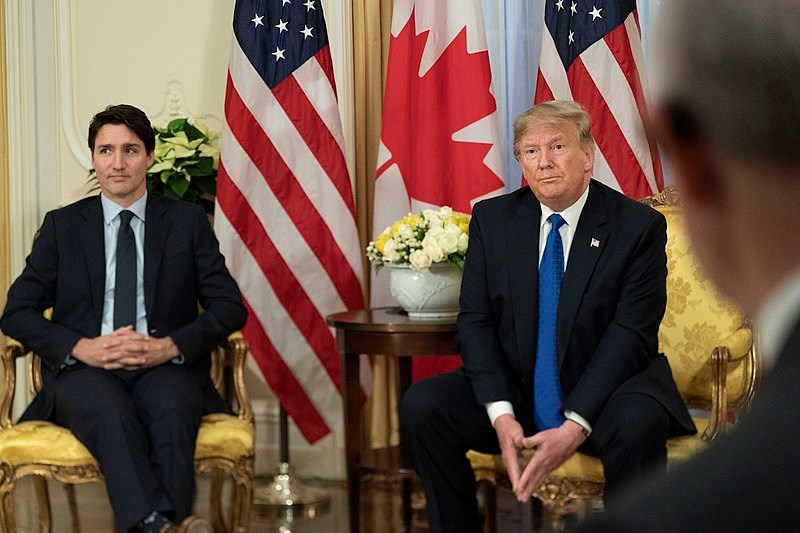Polls show former U.S, president and Republican nominee Donald Trump neck and neck with likely Democratic Party nominee and Vice President Kamala Harris in the campaign to be the next American president.
This comes after a surge of excitement around Harris' seeming ascension to the top of her party's presidential ticket, following U.S. President Joe Biden's July 21 announcement that he will not run for re-election, and that he will endorse Harris' candidacy.
While Harris is polling better against Trump than Biden was, the chance of Trump winning the Nov. 5 election and retaking the White House remains strong.
Whoever leads the U.S. has a significant impact on Canada.
As former Canadian prime minister Pierre Trudeau told an American audience in a 1969 speech: “Living next to you is in some ways like sleeping with an elephant. No matter how friendly and even-tempered is the beast, if I can call it that, one is affected by every twitch and grunt.”
His son, Prime Minister Justin Trudeau, had a rocky relationship with Trump during the latter’s 2017-21 presidency, and has recently made unenthusiastic comments about the prospect of a second Trump term.
“It wasn’t easy the first time and if there is a second time, it won’t be easy either,” Trudeau told the Montreal Chamber of Commerce in a January speech.
University of British Columbia (UBC) political scientist Stewart Prest told BIV that a Trump election win could cut two ways for Trudeau, who is slated to run for re-election next year despite the fact that his Liberal party has fallen far behind the Pierre Poilievre-led Conservatives in the polls.
“A Trump win could give more momentum to Mr. Poilievre, as another indication of the success of the right, and more right-leaning and culturally right arguments,” Prest said.
“On the other hand, if Trump were to win and take office in early 2025 and things go really badly, then that might become a problem for Mr. Poilievre, who would have to justify and say that he’s not going to create a version of that here in Canada.”
Politically, a Trump win has the potential to most rattle Canada on issues such as the economy and trade, immigration and migration, and security and defence.
Economy and trade
Trump has a reputation for being more of a protectionist than a free trader.
His first term in office saw him threaten to tear up free-trade agreements, and he levied new tariffs on various countries, including Canada.
This alarmed Canadian politicians, given that about three-quarters of Canada’s goods exports—equivalent to more than one-quarter of the country’s GDP—go to the U.S.
The Canadian government successfully convinced Trump to renegotiate the decades-old North American Free Trade Agreement, which resulted in what is known in Canada as the Canada-United States-Mexico Agreement (CUSMA).
That agreement loosened Canadian dairy restrictions and forced Canada to provide U.S. dairy farmers access to about 3.5 per cent of the country’s $16 billion annual domestic dairy market.
The U.S. has since increased exports of some milk products to Canada.
“The U.S. won some concessions from Canada, but Canada did a pretty strong job of holding the line on the dairy market,” Prest said.
New CUSMA provisions also related to data and intellectual property, restricting Canada’s ability to require that servers or “computing facilities” be located in Canada, and restricting its development of domestic policies related to data and IP. The agreement also imposed stricter labour and environmental standards.
CUSMA is at risk under a Trump presidency.
Canada, the U.S. and Mexico must by July 1, 2026, confirm in writing that they want to continue the agreement. If any of the countries decide not to renew the agreement, the pact’s future will be in danger.
Tariffs are another risk.
Trump imposed a 25-per-cent tariff on steel imported from a range of countries, including Canada. He also imposed a 10-per-cent tariff on aluminum from Canada and other countries.
This led Canada to impose those same tariffs on U.S. steel and aluminum. Both of those tariffs have been removed.
Trump this year said he would impose a 60-per-cent tariff on Chinese imports and a 10-per-cent tariff—or more—on all imports from all countries.
A 10-per-cent tariff on exports to the U.S. would subtract $7 billion from Canadian GDP annually, representing a 0.3-per-cent decline from the status quo, according to a recent BDC report.
“This drop in economic activity would translate into the loss of around 20,000 jobs in Canada,” the report said.

Stewart Prest is a political scientist at the University of British Columbia | Chung Chow
Central 1 Credit Union chief economist Bryan Yu told BIV that Trump is more protectionist than previous presidents and higher tariffs is a big risk.
“There would absolutely be a lot more of a challenge with a lot of discussions around higher tariffs for all the trading partners, including Canada,” he said.
Prest agreed.
“There’s going to be a number of big industries that have the Trump administration’s ear and we can expect those interests to be vociferously defended,” he said.
Immigration and migration
Trump took a tough line on immigration, migration and all other kinds of entry into the U.S. from the start of his presidency.
One week after his Jan. 20, 2017 inauguration, Trump launched an executive order widely described as a Muslim ban. He restricted entry into the U.S. from five majority-Muslim countries, including Iran, Syria, Libya, Yemen and Somalia. The ban also included nationals from North Korea and Venezuela.
The impact of that since-rescinded order was that Canada likely received more visitors, and more people wanting to be accepted as refugees or immigrants.
If Trump retakes the White House and repeats this tough stance, there may once again be more visitors to Canada. That has the potential to elevate already-soaring prices for hotel rooms and homes in Vancouver.
Perhaps Trump’s biggest campaign promise was to deter illegal migration by building a wall between the U.S. and Mexico, and force the Mexican government to pay for it. That did not happen, though some parts of the wall were constructed.
Much of the U.S.-Mexico border remains without a partition, and illegal migration across that border is once again a hot-button issue in the election campaign.
Trump gave Immigration and Customs Enforcement (ICE) agents more power to enforce laws and detain unauthorized immigrants.
Controversially, he launched what he called a “zero tolerance” policy at the border, leading to children and parents being separated while detained.
He also attempted to end a program that allowed people who entered the U.S. as children and who had lived there for more than five years to have a two-year deportation deferment—a challenge that the courts blocked.
Many who oppose Trump fear that he will ramp up efforts to keep foreigners out of the U.S.
That could lead to more of those people seeking refuge in Canada, said Irene Bloemraad, a professor and co-director of UBC’s Centre for Migration Studies.
U.S. politicians have so far failed to pass a Development, Relief and Education for Alien Minors (DREAM) Act.
If Trump steps up deportations or detentions, so-called “DREAMers” could try to immigrate to Canada, or claim refugee status here, Bloemraad said.
Despite Canada having a Safe Third County Agreement (STPA) with the U.S., people could claim in court that U.S. detention policies are “cruel and unusual,” and that the U.S. is no longer a safe country for deportees. That could prompt Canada to accept them as asylum seekers, Bloemraad said.
While it is illegal for U.S. employers to hire undocumented workers, there is little enforcement because there is little political will to go after employers, she added.
That status quo is unlikely to change under Trump, whose Trump Organization has been accused of hiring undocumented workers, Bloemraad said.
“Trump is obviously someone who is very pro-business, and he is not someone who believes in government regulation of business,” she said.
Canada and the U.S. last year tweaked their STPA to close a loophole that enabled migrants to claim refugee status in Canada without fear of being sent back to the U.S. if they entered Canada at irregular entry points, such as any non-official border crossings. Refugee claims from people arriving at Canadian airports then surged.
“I’m not sure that a tweak in Canadian regulations is going to be enough to stop you [from trying to come to Canada] if you truly fear deportation back to your homeland,” Bloemraad said.

A Trump presidency may deter some foreigners from wanting to study in the U.S., she added. That could prompt a rise in international student applications in Canada as it did in Trump's first term as president.
It is also possible that convention planners could look more favourably at Canadian cities if they fear that some delegates will not be able to attend a U.S. event.
The number of Mexicans entering Canada through B.C. surged during the Trump presidency pre-pandemic. While some of those visitors may have chosen to visit Canada instead of the U.S. because they were turned off by the U.S. president, a bigger factor for most was likely that Canada ended visa requirements for Mexicans starting on Dec. 1, 2016.
Mexican travellers to Canada through B.C. jumped to 13,573 in December 2016, according to Destination British Columbia. That was up 69.1 per cent from the same month in 2015.
A future increase under a Trump presidency is unlikely given that Canada in February reinstated visa requirements for most Mexican travellers.
Mexican visits to Canada have since substantially declined on a year-over-year basis. In May, Mexico was the nation with the biggest drop in year-over-year visitor entries to Canada through B.C. entry points: a 27-per-cent decline.
Security and defence
Trump is expected to lead the U.S. to be less active in global organizations than would be likely under Harris, who lived for a few years in Montreal when she was in high school.
He caused angst among allies earlier this year when he said that he would encourage Russia to “do whatever the hell they want” to any North Atlantic Treaty Organization (NATO) country that doesn’t pay two per cent of GDP on defence.
That includes Canada.
Canadian defence spending has long lagged two per cent of GDP, which is a guideline and expectation of nations in the 32-country military bloc. Trump’s campaign rhetoric and the potential of him becoming president again has prompted renewed efforts in Ottawa to have Canada increase that spending. So has Russia’s war in Ukraine, and heightened military spending among European allies.
“By 2029-30, we expect that our defence spending will reach 1.76 per cent of GDP,” Canadian National Defence Minister Bill Blair said in May.
Trudeau, on July 11, then outlined his timeline to meet the two-per-cent spending goal, though without many details.
“Canada fully expects to reach NATO's two-per-cent of GDP spending target by 2032,” Trudeau told media at a NATO summit in Washington D.C.
He did not outline where the money would come from.
Part of Trudeau’s plan to reach the goal is his commitment for Canada to buy up to a dozen new submarines to replace an aging fleet of vessels that cannot operate under ice in the Arctic.
Another is a partnership with the U.S. and Finland to help finance building icebreakers. Quebec’s Chantier Davie has said it plans to take part in the initiative. Vancouver’s Seaspan is building an icebreaker for the federal government, but it is unclear if it will be awarded a contract under what is being dubbed as a tripartite “ICE Pact.”
Trudeau also this month committed $500 million in additional military assistance to Ukraine.
Prest thinks more Canadian spending on the military is likely if Trump wins the White House.
“On elements that we would more normally think about as being Canadian domestic policy, [Trump] may take more of an interest in lobbying the Canadian government,” he said.
That meddling in Canadian domestic policy could also extend to how it regulates U.S. technology companies, Prest said.
Trump has a reputation for being unpredictable and pushing boundaries in world affairs.
He said last week that Taiwan should pay the U.S. for military protection and accused it of stealing America's semiconductor business. This raised questions over how the U.S. would respond if China invaded what it considers a renegade province.
That unpredictability is also in part why some fear he may put into effect an initiative organized by the activist U.S. conservative think tank Heritage Foundation, known as Project 2025.
That document with plenty of policy proposals aims to reshape the U.S. government to consolidate power under the president.
Exactly what Trump would do with enhanced power, and how it would affect Canada, is anyone’s guess.





